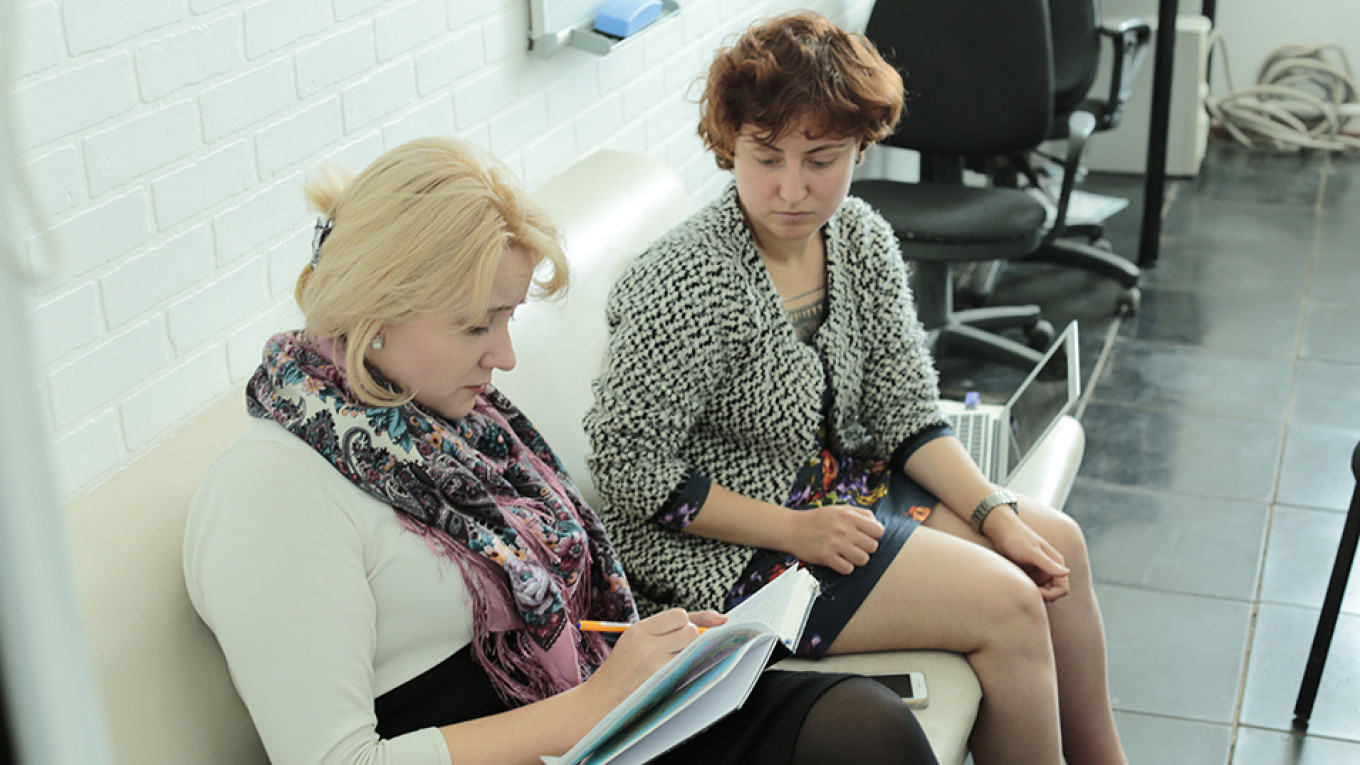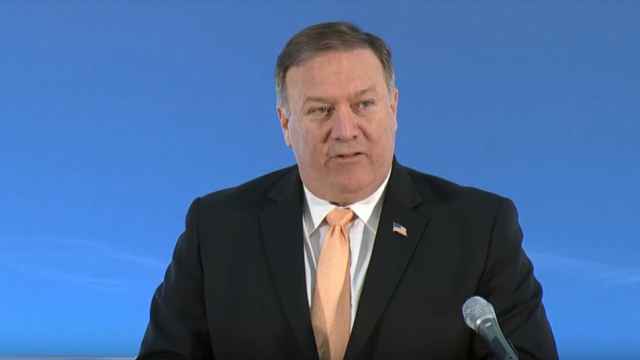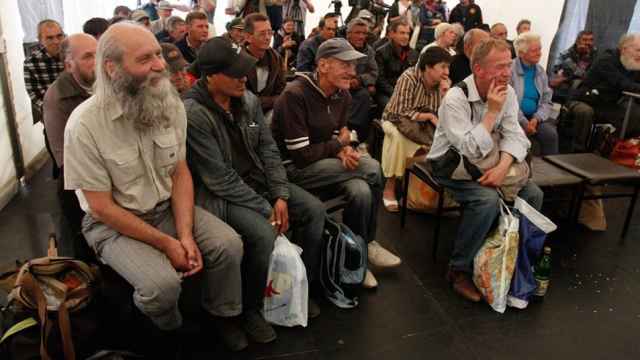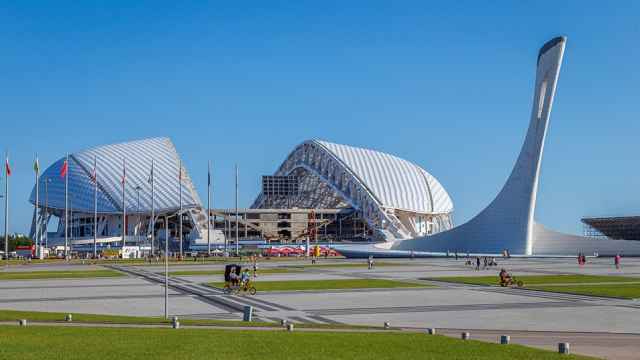The women dotting the side of Leningradskoye Highway, the main artery between Moscow and St. Petersburg, are nicknamed mayachki, or "little lighthouses." Holding flashlights and dressed in neon-yellow vests, they signal to drivers in passing cars.
Behind them, down dirt paths just off the side of the highway, women in skin-tight dresses and stiletto heels wait for clients.
On a Thursday night in late May, the women waiting were on edge. The police had stopped by earlier, and there was a risk that they could return. The zachistki — mop-up operations — had been becoming more frequent.
Even though prostitution is illegal in Russia, there are around three million regular sex workers in the country, according to activist group Silver Rose. Until recently, the group says, the police had turned a blind eye to the practice or taken kickbacks.
But with hundreds of thousands of tourists descending on Russia for the World Cup, the authorities are cracking down on anything that could tarnish their prestige project. For sex workers in the 11 World Cup host cities, this means frequent raids on well-known prostitution sites.
Despite the authorities’ efforts, though, activists warn that the relaxed visa regime introduced to simplify travel to Russia during the tournament is encouraging illegal trafficking of women. As Yulia Siluyanova of Alternativa, a Moscow-based anti-slavery organization, put it, “The World Cup is a gift for traffickers.”
Held captive
On a recent afternoon at Alternativa’s offices near the Kremlin, Siluyanova, an endlessly upbeat woman, outlined her concerns to The Moscow Times.
Between taking phone calls and barking orders at her staff, Siluyanova explained that Russia is relaxing its infamously strict visa regime during the World Cup. For ten days on either side of the tournament, which runs from June 14 to July 15, foreigners will be allowed into the country with just a single match ticket.
Siluyanova, who works mostly with Nigerians, says that several thousand are brought into Russia every year. But during last summer’s FIFA Confederations Cup tournament, when the new visa system was trialed, Alternativa recorded an uptick in trafficking.

“Half are told that they will be sex workers, the other half that they will be working jobs like babysitting,” Siluyanova said, noting that most of the women (and some men) brought to Russia are from West Africa, post-Soviet states and Southeast Asia.
“But neither group knows that when they arrive, their passports will be taken away and they’ll have to hand over on average $50,000 before they get their papers back.”
The women are kept in apartments in small groups, activists have reported, allowed to leave only when they are called by clients over the phone or internet. Those who resist are physically and verbally abused and told that their families back home will be hurt. According to Siluyanova, one woman reported that she was kept locked in a bathroom for three days without food or water. Since the beginning of this year, Siluyanova said, Alternativa has helped to free more than 20 Nigerian women brought to Russia during last year’s Confederations Cup.
One freed woman, named Precious, told The Moscow Times that she came to Russia in September 2016. A woman she met in the Nigerian capital Lagos told her that in Russia she could earn a college degree while paying off the fees through six months of prostitution.
Having dropped out of college several years earlier to support her single mother and four younger siblings, Precious, now 26, thought she had hit the jackpot. “I was too eager for a quick solution,” she said, looking at the floor. “I recognize that now.”
Visibly upset, Precious recounted how after touching down in Moscow, the woman took away her passport. Then she brought Precious to an apartment with six other women, where she was told she’d have to earn $45,000 before her passport would be returned.
Even though she was beaten regularly by the woman who trafficked her, Precious said she feared her clients more. They often hit her, she said, refused to wear condoms, molested her and, on occasion, took their money back afterwards. Once, she built up the courage to protest. In response, she recalled, “The client stole all my clothes and threw me outside in the middle of winter.”
Toothless legislation
Nigerian officials have already expressed concern that traffickers will take advantage of the World Cup and are taking measures to prevent potential victims from leaving Nigeria’s borders. On Tuesday, anti-trafficking authorities reported that they rescued 10 Nigerian children from human traffickers who planned to fly them to Russia.
Still, a spokesman for the Nigerian Embassy in Russia said that “the onus is on the Russian government because they are the ones who screen the people who come here.”
Russia’s Foreign Ministry did not respond to requests for comment for this article. Activists also say that they have had difficulty getting authorities to work with them on the issue.
Veronika Antimonik, programs coordinator of the Moscow-based anti-trafficking SafeHouse Foundation, said that, because Russia lacks a law against human trafficking, there are no government programs directed at the problem. (Although there are two statutes in the Criminal Code, activists say they are toothless.)
Antimonik, who has been running seminars on sex trafficking and exploitation in five of the World Cup host cities ahead of the tournament, said that in Russia, dealing with the issue is generally thornier because of how society views women.
“Mostly, Russians blame women in these cases — trafficking, prostitution, rape,” she said during the seminar in Moscow. “They think these girls know what they’re getting into.”
Irina Maslova, 54, who founded the Silver Rose group, explained that sex workers are “blamed a priori for any trouble they get into.” At turns cheerful, exasperated and angry, Maslova, who has spearheaded the movement to decriminalize prostitution in Russia for the past 15 years, said that women who turn to sex work are the most vulnerable members of Russian society.
Mostly, Russians blame women in these cases — trafficking, prostitution, rape
“The first thing you have to understand about this country is we do not have a rights-oriented government,” Maslova said. Whatever one thinks of prostitution as a profession, Maslova argues, the way the women are treated is a problem that filters up to all levels of society, including law enforcement.
She pointed to a case in 2016 when several men broke into a brothel and forced 10 sex workers to march nude through the streets to a local police station. Maslova, who advised the women in a court case against the men, says police kept them for more than 36 hours without food, water or clothing. (At the time, local news site Fontanka.ru reported that officers “urgently sought” clothes for the women and one man.)
In addition to society’s treatment of the women, Maslova said that because sex work is unregulated, there is a lack of health services for the workers. And because clients cannot be prosecuted for refusing to wear condoms, HIV rates among Russian sex workers are 10 to 14 times higher than for the rest of society, Maslova said. In the government’s absence, she added, volunteers serve as sex workers’ last resort.
Holding out hope
On Leningradskoye Highway, accompanied by the sound of jets from the nearby Sheremetyevo Airport landing and taking off, volunteers from the Moscow-based anti-sex exploitation group Nevoli.net pulled up to one of the mayachki. She let them pass down the dirt path behind her.
Between shifts, the sex workers visited the volunteers who had brought them basic necessities: condoms, on-the-spot STD tests and coffee for the long nights. Most were familiar with the volunteers and chatted freely; others spoke tentatively, if at all.
Two of these women stood behind an older one, like children, as they waited for coffee. The еlder woman, Nelly, said she was in her late 30s, but wouldn’t share the ages of the others, who didn’t speak Russian. All three had traveled from Uzbekistan a few weeks earlier to work during the World Cup. “Maybe we’ll go home after,” Nelly said. “If the work pays well, maybe we’ll stay.”
Another sex worker, Irina, 28, had been working in the industry ever since she moved to Moscow from the southern city of Tambov, eight years earlier. While she said the work paid adequately, she also said that it came with risks.
“Sometimes a client will get really drunk and violent,” she said. “Often, they’ll try to not use condoms.” Asked if there was anyone she could call when that happened, Irina said only her friends. And what, if anything, could improve the situation? “It would be better if prostitution was decriminalized,” she replied. “It would be safer.”
Earlier, Maslova had said that because of the police raids, many regular sex workers have left or are planning to leave the World Cup host cities to avoid being picked up by the police. Once the tournament is over they will return, and Maslova said she will continue working to protect their rights.
“I’m an old lady,” she said. “But I am sure that in my lifetime we will see women treated well in my country.”
A Message from The Moscow Times:
Dear readers,
We are facing unprecedented challenges. Russia's Prosecutor General's Office has designated The Moscow Times as an "undesirable" organization, criminalizing our work and putting our staff at risk of prosecution. This follows our earlier unjust labeling as a "foreign agent."
These actions are direct attempts to silence independent journalism in Russia. The authorities claim our work "discredits the decisions of the Russian leadership." We see things differently: we strive to provide accurate, unbiased reporting on Russia.
We, the journalists of The Moscow Times, refuse to be silenced. But to continue our work, we need your help.
Your support, no matter how small, makes a world of difference. If you can, please support us monthly starting from just $2. It's quick to set up, and every contribution makes a significant impact.
By supporting The Moscow Times, you're defending open, independent journalism in the face of repression. Thank you for standing with us.
Remind me later.







